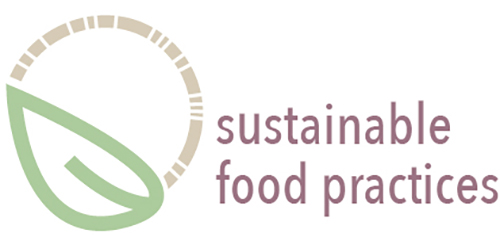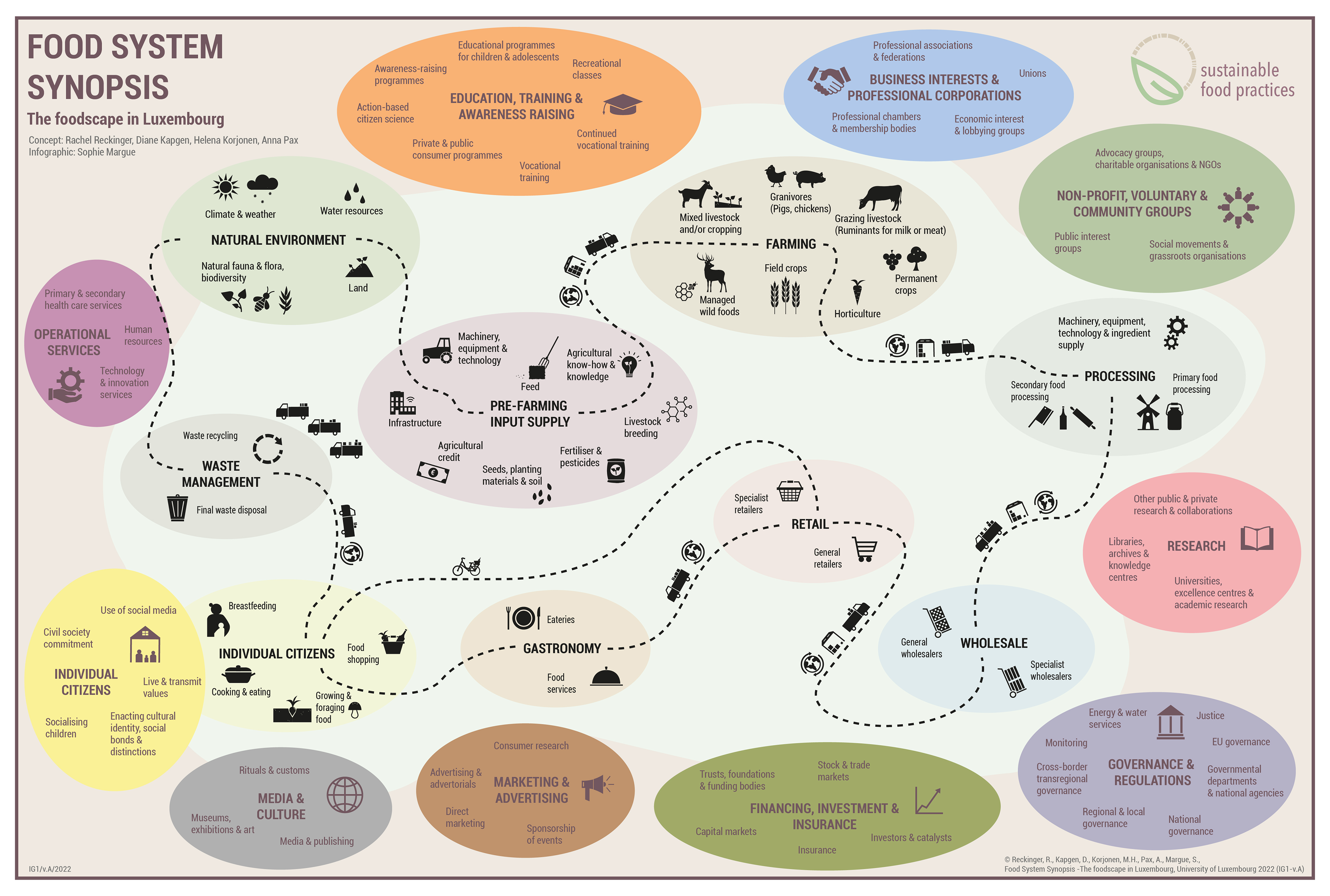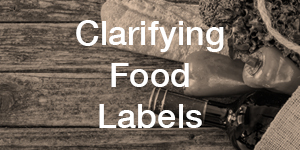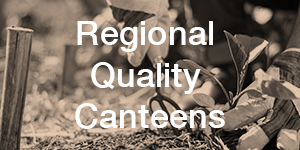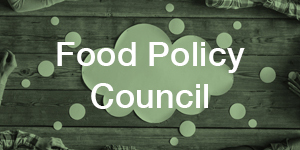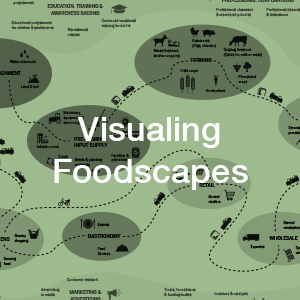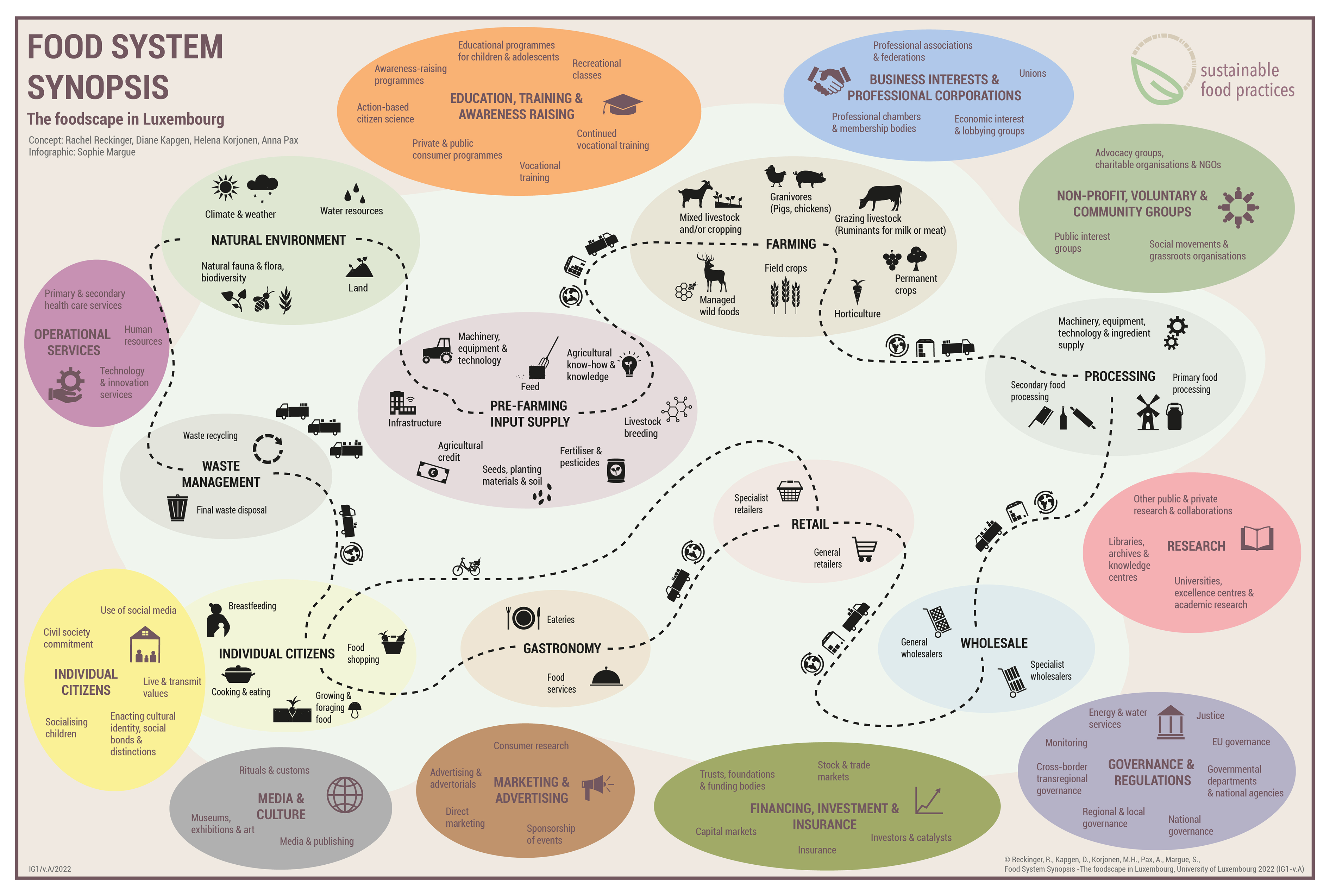Infographic 2: Food System Discovery: Actors and Activities in Luxembourg
This infographic forms part of a larger series of infographics produced by the Sustainable Food Practices team at the University of Luxembourg. The first infographic is titled ‘Food System Synopsis – The Foodscape in Luxembourg’ and is available on our website.
The second and interactive infographic, titled ‘Food System Discovery – Actors and activities in Luxembourg’, derives from our first infographic and provides a deeper level of analysis, a description and definitions of all the actor groups and their activities in the food system. The interactive online version is available here.
The purpose of the series of infographics produced by the Sustainable Food Practices team at the University of Luxembourg is to analyse the food system in Luxembourg in four steps – from mapping the existing foodscape in Luxembourg to elaborating pathways for the transition processes towards a more sustainable food system.
This 2nd Infographic ‘Food System Discovery – Actors and activities in Luxembourg’ (reference: IG2-v.A) allows a user to explore the previously published, first static Infographic (‘Food System Synopsis – The foodscape in Luxembourg’) in further depth using playful and interactive navigation tools.
Our methodological approach to this infographic is available here.
Our research resulted in the two overarching kinds of actors: those that deal directly ‘with’ food – operating at the level of the food supply circuit, and actors engaging in a varied array of activities revolving ‘around’ food – operating at the broader food system level. These two combined comprise the whole food system. The research then led to an ensuing distillation of these actors into: actor categories, actor groups, and actor types, with each level further specifying the activities taken by actors. The definitions of the actor categories, actor groups and actor types allows the infographic to be transposed to other contexts, while only the example actors from Luxembourg are context-specific to the country. For these reasons, the depicted food system is not only Luxembourg’s food system, but a more general view of food systems.
In the future we will build on the two first infographics to demonstrate interrelationships, pressure points, gaps and opportunities – and the outcome of this analysis will provide the basis for the research team to unfold pathways for potential optimisation of different leverage points within the system.
Events

Workshop: “Food Systems Visualisation”
Friday 18th June 2021 from 13:30 – 14:20
The Sustainable Food Practices Team ran a workshop and talk as part of Ernährung & Demokratie. The talk showed how visual tools like infographics are useful for depicting the complexity of food systems while taking into account involved actors’ practices and dynamics. Such infographics can contribute to increase and improve the capacity to grasp and work with diversity, inequity and multiperspectivity typical of food systems.
‘Ernährung & Demokratie’ (Food and Sustainability) was an event on the topic of participatory urban food systems development and building resilient city regions.
“The event is explicitly aimed at representatives from local politics, from district, city and county councils, as well as local administrators. Unlike at the state level, there are no explicit thematic departments for food at the municipal level, so we are inviting all those whose work touches on the cross-cutting issue of food, agriculture and nutrition. For example, representatives from school and youth welfare offices, parks & recreation, urban planning, and land departments, environmental services, health services, but also from the areas of mobility and economic development are all cordially invited to join the conversation with colleagues, scientists and professionals from the field of sustainable food systems.” (Event Programme)
To see the programme, click here.
The event was held in English and German.
Visualising Foodscapes
Infographic 1: Food System Synopsis – The foodscape in Luxembourg
In July 2020, the Sustainable Food Practices team published the first infographic, and its accompanying synopsis, in Forum: Für Politik, Gesellschaft und Kultur magazine. The infographic has been updated in September 2022 and the final version (IG1 v.A) is published on this page.
This visual depiction aims to unravel the complexity of the Luxembourgish food system, and avoid the downfalls of simpler depictions, which focus more directly on key actors, or what can be called the ‘food supply circuit’. The ‘food supply circuit’ includes the actions of:
• pre-farming input supply
• farming
• wholesale
• retail
• gastronomy
• individual citizens
• waste management
While the importance of the roles of food supply circuit actors in the food system is indisputable, focusing merely on them, in a narrower approach, can overlook actors in the broader foodscape, which is why we explicitly include the following sets of actors.
• governance and regulation
• education and awareness-raising
• media
• research
• business interests and professional corporations
• marketing and advertising
• finance
• investing and insurance
• non-profit, voluntary and community groups
• operational services
• individual citizens
Our research resulted in the two overarching kinds of actors: those that deal directly ‘with’ food – operating at the level of the food supply circuit, and actors engaging in a varied array of activities revolving ‘around’ food – operating at the broader food system level. These two combined comprise the whole food system.
The visual depiction of the whole food system shows that the food supply circuit actors operate within, and are constantly affected by and affecting, the broader and broader foodscape.
This infographic is part of a series of four to be published. In October 2022 the second and interactive infographic ‘Food System Discovery: Actors and Activities in Luxembourg’ was published and can be accessed here.
Publications
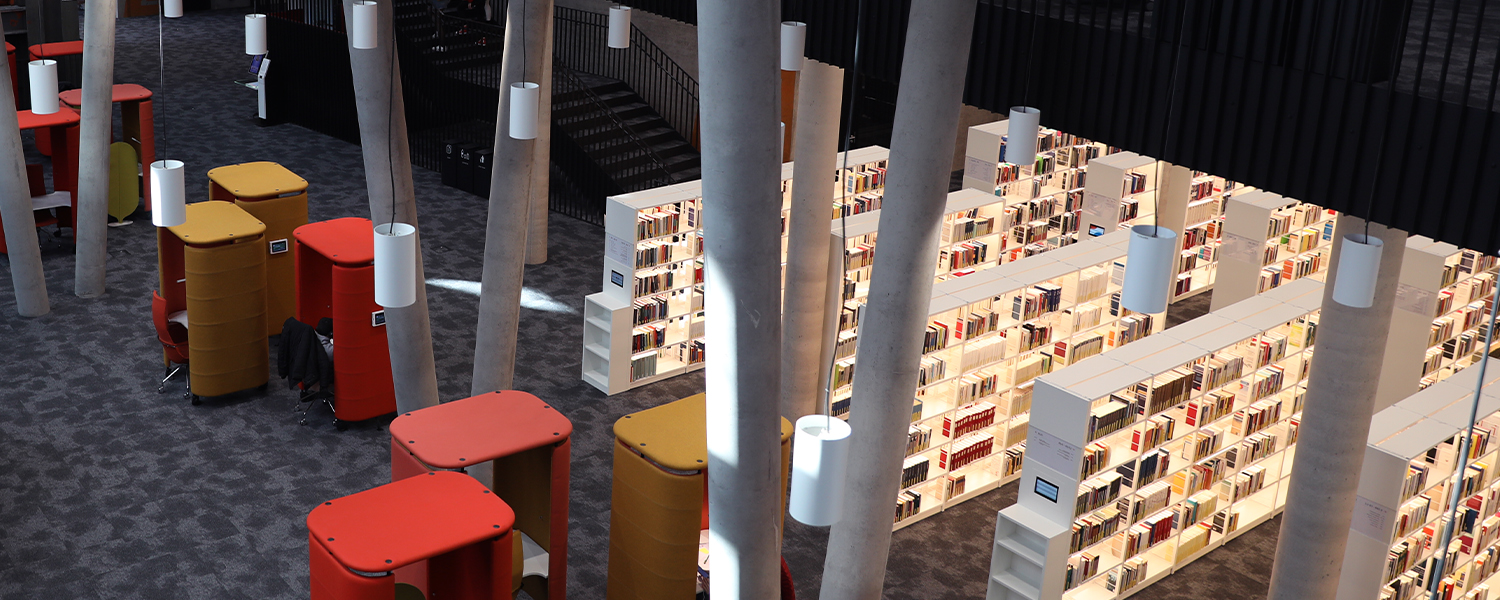
An Infographic Synopsis of Luxembourg’s Food System
July 2020
Article link: https://orbilu.uni.lu/handle/10993/43965
The team of Sustainable Food Practices, Dr. Rachel Reckinger, Dr. Diane Kapgen, and Dr. Helena Korjonen published their infographic synopsis of the Luxembourgish food system in Forum. The visual depiction aims to unravel its complexity, and avoid the downfalls of simpler depictions, which focus more directly on key actors, or what can be called the food supply circuit. The ‘food supply circuit’ includes the actions of input-supply, farming, processing, manufacturing, trade, gastronomy, consumption and waste treatment. While the importance of the food circuit actors is clear, this narrow approach often overlooks actors in the broader foodscape including:
• governance and regulation
• education and awareness-raising
• media
• research
• business interests and professional corporations
• marketing and advertising
• finance
• investing and insurance
• non-profit, voluntary and community groups
• operational services
• individual citizens.
The visual depiction of the food system shows that the food supply circuit actors operate within, and are constantly affected and affecting, the broader and more diverse foodscape.
This infographic has since been updated. To see the latest version click here.
Future developments in the project will include analysing the actors and the scope of their power, their relationships, pressure points and barriers, but also the opportunities and innovations that thrive in the food system.

